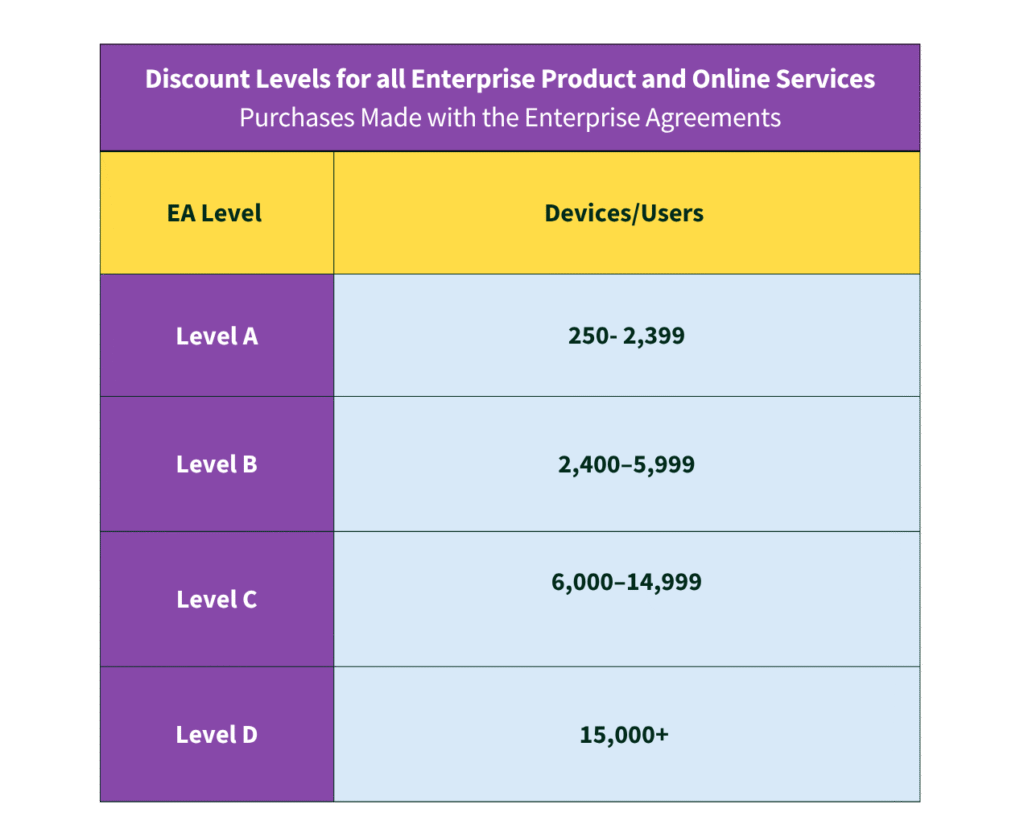Starting November 1, 2025, Microsoft is overhauling its pricing model for Online Services under Enterprise Agreements (EA)—and calling it “simplification.” But for CIOs, IT directors, and procurement leads, it’s anything but simple. The elimination of EA volume discounts means every organization, regardless of size, will pay list price. That’s not a pricing tweak—it’s a strategic shift with serious budget implications. If you’re staring down a renewal, The IT Strategists break down how Microsoft ending the EA discounts will impact your IT budget, how to quantify the impact, and what steps to take now to protect your IT budget.
No More Waterfall Discounts: Everyone Pays List Price
Gone are the days of “the bigger we are, the cheaper it gets.” Beginning with renewals after November 1, every organization—whether you have 500 seats or 50,000—will start at the same publicly listed price. Microsoft is flattening the pricing tiers, removing the waterfall discount structure that rewarded scale:
• No automatic discounts for seat volume
• No incentive for scale
• No pricing advantage for large deployments
Whether you have 500 seats or 50,000, you’ll start at the same publicly listed price. This isn’t just sticker shock—it’s strategic disruption.

Who’s Impacted by Microsoft’s EA Pricing Changes?
This isn’t just a big enterprise issue. The change affects a wide range of Microsoft licensing agreements:
- Enterprise Agreements (direct and indirect): Whether you buy through a reseller or directly from Microsoft, the new pricing model applies.
- Microsoft Products and Services Agreements (MPSA): Organizations using MPSA for flexible purchasing will also lose volume-based pricing advantages.
- Online Services Premium Agreements (OSPA): Even premium-tier customers aren’t exempt—everyone starts at list price.
Importantly, this change only affects Online Services. On-premises licensing remains untouched. That means products like Microsoft 365, Dynamics 365, Azure, Windows 365, and Microsoft’s security and compliance tools are all impacted. Yes, even Copilot—though it’s already priced flat.
Why This Hurts: The End of EA Volume Incentives
For decades, Microsoft’s EA waterfall pricing gave large organizations a reason to consolidate seats and scale up. Bigger deployments meant better discounts. That incentive is now gone.
- No tiered pricing leverage. Therefore, there are no automatic discounts for seat volume. Your user count no longer guarantees a better deal. Every renewal starts at the same baseline.
- Negotiation becomes critical: Without tiered pricing, Microsoft reps hold more power. You’ll need to come to the table with data, strategy, and alternatives.
- Budget planning gets harder: Predictable pricing is out. Expect variability and prepare for tough conversations with finance.
What You Should Do Right Now
If your EA renewal is approaching, especially near or after November 2025—you need to act fast. Here’s how to get ahead:
- Pull your current agreement: Understand your current pricing level and quantify the value of your existing discount. This is your baseline.
- Run the numbers: Use the percentage increases above to model your new costs. Don’t wait for the renewal quote—forecast it now.
- Start strategic conversations early: Engage stakeholders, explore CSP alternatives, and prepare negotiation tactics. The earlier you act, the more options you’ll have.
The Bottom Line: Prepare or Pay
Microsoft’s decision to eliminate EA volume discounts marks one of the most significant licensing changes in the last decade. It’s not about simplifying your life—it’s about simplifying theirs. And it’s going to cost you.
If you wait until renewal time, you’ll be blindsided. But if you start modeling now, you can prepare for negotiations, explore cloud solution provider (CSP) options, and potentially avoid a major budget bleed in 2026.
Up next in Part 2: Why Microsoft says they’re doing this, what’s really behind it, and how it changes the balance of power at the negotiation table.
- Microsoft Online Services pricing update
- Change to Microsoft volume licensing discounts coming November 2025
Need help navigating this change?
Whether you’re recalculating costs, rethinking your licensing strategy, or preparing for tough negotiations, it pays to talk to someone who’s been there. Schedule a free consultation with an expert at www.theITstrategists.com and get tailored guidance for your organization.

